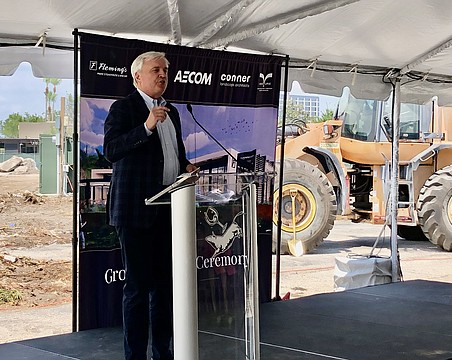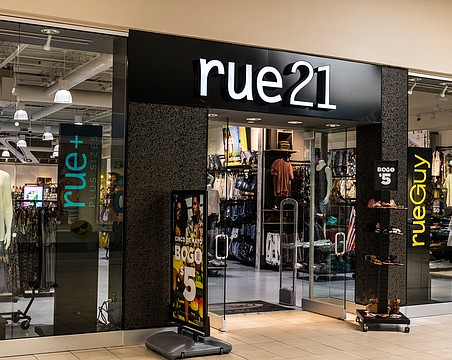Out of the Mold
by Francis X. Gilpin | Associate Editor
This guy was supposed to be a friend. "Are you kidding me?" Edward F. Venner says he told a Florida pal who called him in 1982 with a business proposition.
Venner, 48 at the time, had risen to vice president of manufacturing at Fairbanks Scales, then a division of Colt Industries, and had 600 employees at three plants reporting to him in Vermont. "White shirt and tie, don't get my hands dirty," Venner recalls thinking, "to being the sole employee of a new company?"
Yet, three months later, Venner was in Pinellas County. He had chucked the tie for machinist garb and owned 40% of Ven-Tel Plastics Corp. "You name it, I did it," he says in his nonchalant manner, "from washing the johns to making sales calls."
What possessed Venner to give up a fairly secure job in scenic "The Sound of Music" country for the uncertainty of middle-age entrepreneurship? Venner says he didn't have a burning desire to be his own boss. He and his wife, Catherine M. Venner, simply wanted to be closer to their parents, who were living in Florida.
The Venner children were in college. Ed Venner was promised a comfortable early retirement within five years. So why not?
Today, 24 years later, Venner is still working. Being an American manufacturer during an era of accelerating globalization has been no trip to the beach. "We have lsot some business to China," says Venner. "But its been small parts."
Now the sole owner of the privately lheld Largo copmany, Venner has the satisfaction of knowing that Ven-Tel is one of the best-regarded makers of thermoplastic products from precision injection molds in the state. Last year, Ven-Tel sold about $5.5 million worth of plastic products for aerospace, automotive, electrical, horticultural and medical use.
At 71 years old, however, Venner is contemplating retirement - this time for real, both due to age and health concerns.
Do it yourself
With a mechanical engineering degree from Stevens Institute of Technology in New Jersey, Venner prides himself on being able to work most all of his own molding equipment. That goes back to the single machine he began with. "I was adamant that I be able to operate anything we had on site," he says, "only because I didn't want to be at the mercy of some individual to run a machine."
Running the rest of the place was another matter. "We had roughed out a business plan, as to how we were going to, quote, 'grow the business,'" he says. "All of the assumptions that we made turned out to be false."
Friends in the manufacturing business who claimed to have an insatiable need for plastic components were either exaggerating or found other suppliers by the time Venner called. "None of them ever came through the door," says Venner.
So Venner hit the road and picked up two accounts. That allowed the company to go from one to three molding machines. After the three machines were up and running for about a year, Venner and his partners split.
Ven-Tel hardly missed a beat. The company has been running three shifts, seven days a week since then. "We just kept hammering away over time," Venner says.
Customers from California to New England have gradually drifted away. The majority of current customers are in Florida, with the biggest one being Punta Gorda-based chemical pump maker Pulsafeeder Inc.
Ven-Tel specializes in handling small or medium-sized orders for custom pieces that go into the assembly of items ranging from ornamental lights to medical tubes.
Venner says his company has gained a reputation at the nearby defense plants of Honeywell International Inc. and Raytheon Co. for finding creative solutions on short notice. He recalls one order: "Once we got the product developed, they told us that others who had bid that job told them nobody could mold it," says Venner. "We didn't know that at the time."
Ven-Tel is also willing to mold ahead for inventory. Customers don't have to wait for a supplemental order to be filled. The product is on the shelf at the 104,000-square foot plant, ready for shipment.
Sale is possible
The company has been able to fend off foreign competition because customers figure it's not worth the puny savings to send small orders overseas to a low-wage subcontractor.
"They don't want to make 500 of anything," Venner says of Chinese manufacturers. "Five hundred thousand? They're very good at that."
Besides the volume requirement, transporting some plastic components can be problematic. "If it's a big part that doesn't stack or nest, then you're shipping a lot of air, and that gets to be expensive," Venner says.
Most of the plastic molding for medical instruments used in the United States is still done stateside. The medical industry accounts for 60% to 70% of Ven-Tel's business. That should keep the company busy following a general retooling of Ven-Tel's 36 machines last year that caused the first sales decline in company history. But the Venner family soon may be less of a presence among the 80 employees at the Largo plant.
Venner's wife, Catherine M. Venner, retired in 2001 as the company's office manager to take care of her parents. Ed Venner says he is now entertaining an offer to sell Ven-Tel. Unlike previous overtures, Venner says this price is right. "It meets my needs," he says.
Venner is battling skin cancer, too. His melanoma has metastasized and he recently completed chemotherapy. "It's a pretty dramatic treatment," he says. "A lot of people who have severe problems give up on taking the treatment."
Jay Venner, the couple's 46-year-old son, is vice president of operations and information technology at Ven-Tel. Jay Venner is likely to stay on, according to his father, even if the company is sold.
GOAL FOR 2006
Tax relief
More than 37,000 Floridians work in the medical manufacturing industry at an average salary that tops $50,000 a year, according to a trade group.
But Florida is one of a few states that taxes the molds used to produce plastic products, including the medical devices turned out by Ven-Tel Plastics Corp.
The sales tax tends to make Florida injection molders less competitive than counterparts in other states. Georgia no longer requires a mold tax.
The tax is rare enough that plastics companies entering the state don't realize they must collect it at their Florida plants. "A lot of manufacturers get hung in sales tax audits," says Edward F. Venner, president and chairman of Ven-Tel.
The American Plastics Council hired a Tallahassee lobbyist six years ago but has failed to win tax relief. Geary A. Havran, chairman of the Florida Medical Manufacturers Consortium, hopes this year will be different.
Gov. Jeb Bush has proposed $69 million in annual sales tax exemptions for machinery and equipment of high-value Florida manufacturers. Havran, who is also president of St. Petersburg device maker NDH Medical Inc., says he thinks mold tools should be included.
In January, the consortium invited state lawmakers from Pinellas County, where Florida's medical manufacturing industry is concentrated, for a roundtable discussion of the sales tax and other issues. Florida is second in the nation when it comes to medical instrument makers registered with the U.S. Food and Drug Administration.
"We felt they were receptive," Havran says of the Pinellas legislators. "Time will tell."





